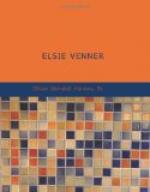“Why, of course. Each of us is only the footing-up of a double column of figures that goes back to the first pair. Every unit tells,—and some of them are plus, and some minus. If the columns don’t add up right, it is commonly because we can’t make out all the figures. I don’t mean to say that something may not be added by Nature to make up for losses and keep the race to its average, but we are mainly nothing but the answer to a long sum in addition and subtraction. No doubt there are people born with impulses at every possible angle to the parallels of Nature, as you call them. If they happen to cut these at right angles, of course they are beyond the reach of common influences. Slight obliquities are what we have most to do with in education. Penitentiaries and insane asylums take care of most of the right-angle cases.—I am afraid I have put it too much like a professor, and I am only a student, you know. Pray, what set you to asking me this? Any strange cases among the scholars?”
The meek teacher’s blue eyes met the luminous glance that came with the question. She, too, was of gentle blood,—not meaning by that that she was of any noted lineage, but that she came of a cultivated stock, never rich, but long trained to intellectual callings. A thousand decencies, amenities, reticences, graces, which no one thinks of until he misses them, are the traditional right of those who spring from such families. And when two persons of this exceptional breeding meet in the midst of the common multitude, they seek each other’s company at once by the natural law of elective affinity. It is wonderful how men and women know their peers. If two stranger queens, sole survivors of two shipwrecked vessels, were cast, half-naked, on a rock together, each would at once address the other as “Our Royal Sister.”
Helen Darley looked into the dark eyes of Bernard Langdon glittering with the light which flashed from them with his question. Not as those foolish, innocent country-girls of the small village did she look into them, to be fascinated and bewildered, but to sound them with a calm, steadfast purpose. “A gentleman,” she said to herself, as she read his expression and his features with a woman’s rapid, but exhausting glance. “A lady,” he said to himself, as he met her questioning look,—so brief, so quiet, yet so assured, as of one whom necessity had taught to read faces quickly without offence, as children read the faces of parents, as wives read the faces of hard-souled husbands. All this was but a few seconds’ work, and yet the main point was settled. If there had been any vulgar curiosity or coarseness of any kind lurking in his expression, she would have detected it. If she had not lifted her eyes to his face so softly and kept them there so calmly and withdrawn them so quietly, he would not have said to himself, “She is a lady,” for that word meant a good deal to the descendant of the courtly Wentworths and the scholarly Langdons.




